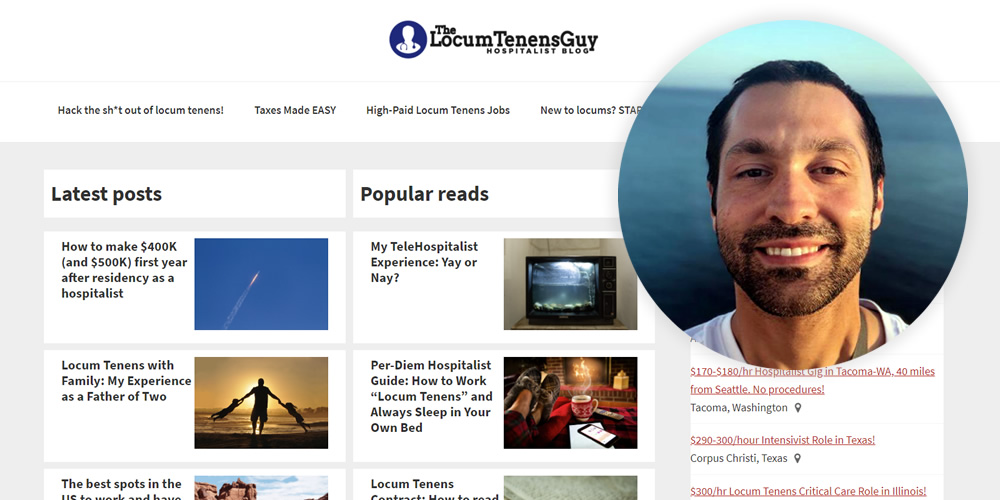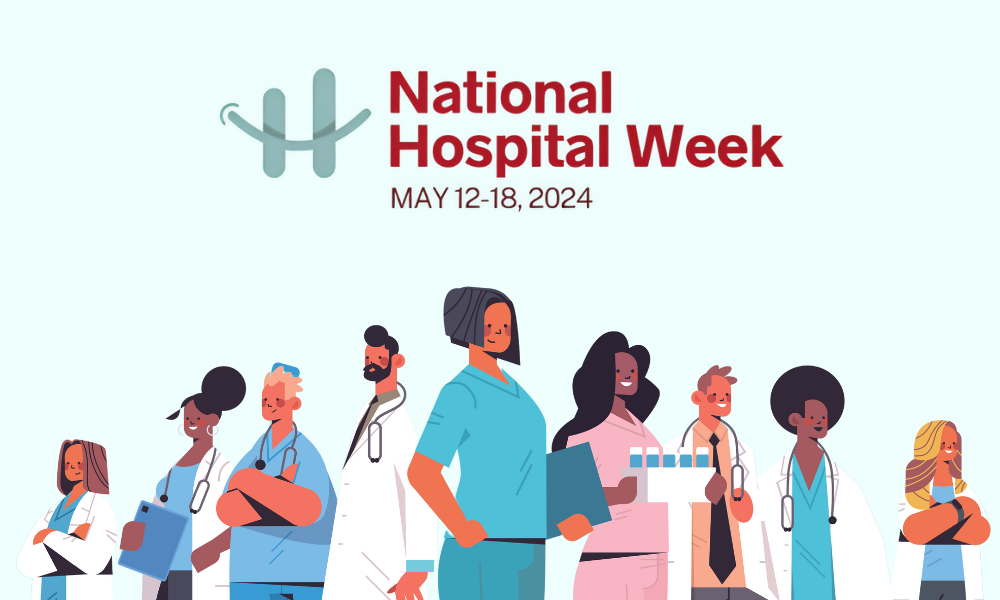Locum Profiles is Locumpedia’s spotlight of locum tenens advocates who are successfully practicing or supporting the locum tenens way. Subscribe to our newsletter to read new profiles before they’re published here.
For hospitalist Vlad Dzhashi, MD (aka, “The Locum Tenens Guy“), working locum tenens is all about time and money. That is, making time for the things most important to him — and making more money in less time.
Locum tenens, Dr. Dzhashi advises, allows a physician better-than-average income and maximum flexibility in balancing personal and professional life.
In the intro to his version of “The Only Locum Tenens Guide You’ll Need in 2021,” Dr. Dzhashi notes, “With locum tenens, you get so much more control over your schedule and lifestyle. You can work really hard for months and then take months off to do whatever you want. You could create a very comfortable schedule and work less while making the same amount as permanent docs.”
“The Guy’s” Back-story
Married with two children (ages “almost-4” and 9), Dr. Dzhashi’s priority is “family time over everything else. I want to see my kids grow and experience life with them,” he says.
Having graduated medical school in Moscow, Russia, and practiced medicine since 2012, Dr. Dzhashi completed his residency at UPMC Pinnacle in Harrisburg, Pa., area. He worked as a full-time hospitalist for 2.5 years at Kadlec Regional Medical Center in the Richland/Kennewick/Pasco, Wash., area before trying locum tenens and deciding to forego permanent employment.
Working through locum tenens agencies in the early days, Dr. Dzhashi traveled 7 to 10 days a month. He got a virtual phone number to manage the inevitable agency solicitations. “Personally, after ‘pulling the plug’ on a permanent job, I’ve found it’s much easier to plan vacations and avoid working nights, holidays, and other important days like my kids’ birthdays,” Dzhashi says.
However, if you’re considering locum tenens as a “try-before-you-buy” employment option, this happy hospitalist’s experience indicates colleagues generally are grateful you’re there and, assuming you’re good at your job, you’ll get full-time-job offers.
Predictability Problems
Dr. Dzhashi explains that full-time hospitalists generally work a 7 days on/7 days off schedule, or slightly shorter or longer stretches of “on” and “off” time. He notes that some staff hospitalist jobs include 11 days of PTO (paid time off) a year, “although, more than 50% of hospitalists do not get any PTO at all.”
This means the full-time hospitalist works about 170 shifts a year, Dr. Dzhashi says. “At first glance, it looks like you work less than half a year,” a big relief for a recent resident accustomed to nonstop, 80-hour weeks.
However, the predictability of a fixed schedule becomes a problem when a holiday, or other important personal event (e.g. kid’s birthday, anniversary), falls within the hospitalist’s 7 days “on.” Other scheduling issues, like…
- Eventually having to rotate through night or swing shifts,
- Finding you’re “at your administration’s mercy” and must compete with peers for PTO, or
- Wanting to take more than 7 days off in a row
… make “flexibility” a huge tradeoff for that predictability. Especially for hospitalists whose personal life is a bigger priority than professional politics.
Enter locum tenens — or as Dr. Dzhashi describes it, “freelance medicine.”
Locums Life
In a November 8, 2018, blog post “The Guy” described the scheduling flexibility locum tenens afforded him and how he envisioned his 2019 freelance medical practice fitting around his peak family times. “The way I’ve created my schedule this year is to work about 160 shifts. (My thought was it would give me a good income and leave plenty of time off.) Then, I distributed them throughout the year around the school break time.“
Dr. Dzhashi has achieved a lifestyle to be envied through working locum tenens. He travels with his family for two full months every summer “without asking anyone’s permission.” He works a light schedule through the peak flu-season months of January and February. And he avoids night shifts like the plague to protect the precious recovery time those nocturnal shifts cost him.
Noting the typical locum tenens assignment is 3 to 6 months for hospital medicine, Dr. Dzhashi admits things don’t always work out exactly as planned. He describes having had to scramble a couple of times to replace planned shifts canceled on short notice, and having to pick up extra shifts throughout the remainder of one year after he found himself without work for 8 weeks straight.
“What I am trying to say is that my locum schedule is not perfect, but it’s always very good. That’s because I have the maximum possible control over it!” he wrote.
In comparing full-time to locum tenens work, Dr. Dzhashi shared his philosophy of freeing up time each year “to learn something new or experience the things we’ve always dreamed about,” he wrote. “Every time it gives me a new perspective and mental energy boost for months to come.”
He credits locum tenens with offering options for making the most of his ‘off time.’ “I’m convinced my life became much richer with those experiences,” he said.
Balancing Act
However, after a couple of years of traveling a lot — and after children entered his personal picture — he sought a way to maintain the locums flexibility while working closer to home. That’s when he transitioned to working primarily on a per diem basis (contracting directly with healthcare employers) and picking up locum tenens work here and there.
“I have a wife and two children, and my goal has been to cut back on travel as much as possible,” Dr. Dzhashi says. “I realize I probably could have made much more money chasing higher-paid gigs in different states,” he continues. “But that would mean more time away from my family, so the choice was easy for me.
“Now that my older kid is in school and my youngest is almost 4, I’m fine with traveling for a week per month to work,” Dr. Dzhashi says. “However, I should point out that I only do it if it makes sense financially (i.e., I make more when working away from home). This gives me a chance to work less when my kids are out of school so we can travel as a family. This is absolutely the best time for me: so many great memories and experiences.”








